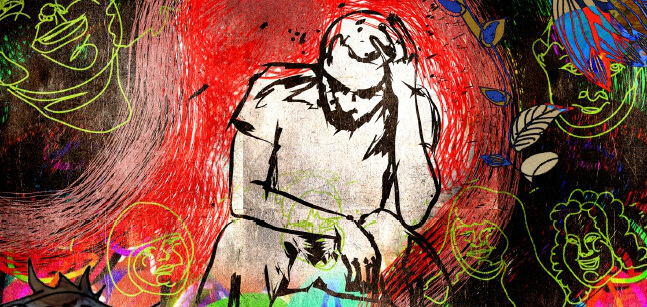
Artwork by Ravi Thornton
A short piece touching on some of the lessons learned from years of working within the mental health system.
So it’s “Mental Health awareness week”. This year it seems more people are opening up and sharing their struggles. We are definitely in the beginnings of a culture shift when it comes to mental health being taboo. This is no doubt the fruits of labour from the hard work of countless advocates over the past few years. If you feel that you could benefit from additional mental health support, click here.
I personally have been in the mental health game for 5 years professionally, and a further 5 years through education. Throughout my time in the psych world, I have learnt some important lessons which I believe is valuable for all of us to know.
Lesson 1. My bachelor degree meant nothing.
Two years in college, four years at university — and I drew more from my experiences as a bouncer than I did with the theories and models I learnt in the lecture hall. Why a person ends up in the mental health system is more complex than a theory devised in the 1970s can comprehend. My post-graduate degree was useful, but again, it poorly equipped me with the reality of helping people. My real education was working in the front line of mental health services. So when working with a practitioner, look for their ability to understand you — not how prestigious their credentials are (but still always make sure they are trained to the minimum standard).
Lesson 2. Drugs are the primary and secondary option in healthcare.
Depressed? Take drugs! Going through psychosis? Take drugs! Are the anti-psychotics causing you extreme side effects? Take more drugs! Alternative therapies are all too often the lesser used options in the “one-drug fits all” medical model. Furthermore, it is now clear from using this model for decades, that drugs only serve to suppress mental health problems, it cannot cure them.
Lesson 3. The system is only really there to stop you from harming yourself and others.
Anything extra is a bonus but should not be expected. If you want to help someone, work around the system. Too many people call for change in the system, but ignore how much of a positive impact they can have at the ground level. It takes passionate individuals to make change, not the perfect policy.
All of this creates a system where vulnerable people end up locked in small wards, pumped full of drugs, and shipped off back into their tough lives at first sign of recovery. Long term patients end up developing further disorders like depression, social anxiety, agoraphobia, drug dependency, diabetes and much more during their treatment. Are we not supposed to go hospital to get rid of disorders, not pick up extra ones?
In the process, we can also end up losing our identity. An upcoming rapper can slowly become known only as Patient A with schizophrenia. A talented artist can become Patient B with bipolar. An abused person becomes Patient C who self harms. It can be hard to remember who you was before it all began.
So. From all my experience and lessons, what can I offer you to help keep yourself mentally strong? How can you avoid losing yourself in a system of drugs and cost calculations?
Well. First I would recommend you find your voice. Make sense of your story and learn how to communicate it better. I can give you a long list of books to read and therapy techniques to try — but in my opinion there is no initial step better than using your own strengths and familiar language to communicate your needs. Whether it be through writing a few bars, painting a picture, campaigning for a cause or something else — find what langauge works for you.
Once you find your voice, use it to make sense of your story. Then, if one day you find yourself in the mental health system, you will have your voice to see through and help retain your identity.
Use your voice to build your own therapy and tools that works for you. Don’t rely on an over stretched system that can only provide the minimum of drugs and 10 minutes with a psychiatrist once a week.
You are the strongest asset and most knowledgeable expert on your road of recovery.
